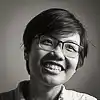“I am a social activist,” Lương Thế Huy says when asked to introduce himself to Saigoneer. It is hard to imagine a different answer, or Huy in a different role, when he has spent a decade pursuing this path.
Lương Thế Huy, a 33-year-old activist born in Saigon, has been a prominent name behind various campaigns that advocate for LGBTQ+ and minority rights in Vietnam. At the same time, Huy is currently the Director of the Institute for Research on Society, Economics, and Environment (iSEE). With his contribution to social work and human rights projects, Lương Thế Huy was named one of Vietnam's 30-under-30 in various fields by Forbes in 2016.
Just recently, Huy was one of the three self-nominated candidates for the 15th National Assembly election in Hanoi, with the goal to represent the voices of young people and diverse minority communities in society. He aimed to focus on gender equality issues, public health, youth education, environmental issues, as well as the foreign affairs of the National Assembly.

Lương Thế Huy (second from right) is one of the most prominent young figures behind a number of campaigns that advocate for LGBTQ+ and minority rights in Vietnam.
Saigoneer was lucky to have the chance to hear Lương Thế Huy share stories from his activist work and the journey to promote equal rights in Vietnam.
Can you tell us a little bit about yourself and your work?
I am an activist, a law graduate, and an openly gay person. Currently, my official job is being the director of iSEE. This is a non-governmental, non-profit organization that supports minority groups such as women, children, people with disabilities, ethnic minorities, and of course, LGBTQ+.
I was greatly inspired by a quote by Dr. Martin Luther King, Jr.: “Injustice anywhere is a threat to justice everywhere.” The longer I work in activism, the more accurate I find it to be. Every injustice in society, no matter which group of people it affects, all have a common cause. We allow, even facilitate, that injustice by accepting it as a reality. As a community, we cannot expect those injustices to disappear by themselves. Thus, I choose this path to fight for equality and the elimination of prejudice against minorities in Vietnam.

There are many ways to raise public awareness, why did you choose policy advocacy?
I see policy advocacy as a discussion between different groups, through which they seek common ground. That common ground will be reflected in the legislation passed for everyone to follow. This is the least we could do for the minorities at the moment.
For instance, if there is a law that prohibits discriminatory acts against the LGBTQ+ community, online hate crimes will cease because society has deemed this unlawful.
If law and authority agree but social perspectives remain the same, will policy advocacy be similar to “putting the cart before the horse”?
[With social work], we will never reach an ideal ending. Our society is composed of many different groups of people and every group will have a different interest.
To completely change our society’s perspective, we need everyone to accept and welcome one another. However, not everyone can comfortably accept what they do not believe in or go against their habits and life experiences.
Let’s approach the problem from another direction: if you want to move forward, should you put your right foot first, or your left foot first? The answer is: either is fine; as long as it feels convenient, the other leg will follow. The same applies to policy advocacy. The law can come first, then follows the public conversation.
Do you find difficulties when encountering barriers in your policy advocacy journey?
Recently, the frequency of conservative articles has significantly increased. Many people, including myself, are concerned: “Is the social view going backward?”
Just last week when I was clearing out my hard drive, I found a folder with so many screenshots of hateful, discriminating comments on our Facebook page from a long time ago (luckily those were the only few negative comments amongst countless supportive ones). I suddenly realized that close-minded ideas have always and will always exist, it’s just that there are more platforms for them to spread nowadays.
Thus, I am not pessimistic about these “barriers” getting in the way of my advocacy campaign. But I am indeed concerned if we are unable to challenge one another respectfully due to our opposing opinions.
What do you believe are the biggest successes you have had during your advocacy?
I think the biggest success so far is the fact that people are beginning to pay more attention to social issues, especially concerning minorities. This is clearly shown through the vital discussions happening on social media.
I was incredibly happy and proud upon hearing the government's firm statements about not tolerating any form of discrimination. Human rights laws are also included in the second chapter of the constitution. These significant changes would not have been achieved without the constant effort of social organizations and the voices of many minority individuals themselves.

In your opinion, what are the current barriers to changing public perceptions?
The different streams of opinion are becoming increasingly polarized. This is a trend that is happening in most countries around the world, including Vietnam. This is when people are so stubborn about their point of view that they refuse to self-reflect. They believe that their belief or opposition is the only truth, leading to the groups not being able to conduct vital and helpful conversations.
Polarization may lead to other side effects, such as the spread of false news, or offensive statements coming from both sides. I hope that in the near future, people can approach one another in a more straightforward and respectful way. Let’s discuss with one another using points, evidence, scientific data, not just merely using personal beliefs to suppress other groups.
You mention the concept of “equality” a lot. What does this concept mean to you?
For me, equality is when every person feels seen, heard, and accepted for their real identity and the value that they contribute to society. Equality exists at every level, from the individual, family, neighborhood, to the community, society, and country.
Some people have quite a strong reaction to current societal changes. They often mock equality movements using words like "thượng đẳng" [holier-than-thou]. What do you think of this?
I believe that people are not opposed to the progress of society, but rather they are afraid to lose the privileges that they already have. It is true that to achieve true equality, there has to be a lot of change.
For instance, when meeting a male person, people often ask: “Do you have a girlfriend?” But then for the LGBTQ+ group, nouns need to be more inclusive and non-assuming, such neutral words can be “partner" or “girlfriend or boyfriend.”
People will think: “Oh my god, this is such a normal sentence that I always say. Why do I have to self-censor now?” So the strategy here is to show those people the benefits of these changes, the positive effects that both sides will achieve when they steer away from old, outdated habits.

You are Vietnam’s first openly gay candidate of the National Assembly. Did being open about your sexuality affect your candidacy?
Coming out was not a big issue for me, because no matter what my sexuality was, my job is still stable and my family still accepts me for me. Being open about my sexuality was helpful for other people and so I did.
When there is a gay candidate, society will see that people from the LGBTQ+ community are normal citizens like everybody else. They are willing to work for the country in many different ways. They are entitled to human rights and are willing to fulfill their responsibilities for the community. Every person of the LGBTQ+ community also has their individual ways of proving themselves. Some are diligent office workers, some are incredible teachers. My candidacy is just another contribution.
One of your most active advocacy issues is for the legalization of same-sex marriage. Why so?
Marriage equality is just one of many aspects within human rights that the LGBTQ+ community is concerned about. Beside that there is equality in employment opportunities, equality in education, equality of access to health care, etc. However, marriage remains the most cared about issue because it touches on many aspects as well as illustrates how our society values love and family. When same-sex couples are protected under the law, society will also become more accepting and welcoming of such relationships.
Even though the legal framework is still unclear regarding same-sex marriage, many couples still live together as a family. They share a home, cook together, pay utility bills, and raise children together. Love remains sacred between people and people, and nothing can stop that. They just need to be protected by the law just like any other citizens.

















